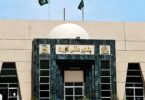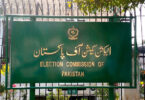KARACHI: Chief Minister Sindh, Syed Murad Ali, has said that he had no objection over the court’s decisions but double standards demonstrated by the national accountability bureau (NAB).
“We oppose the double standards of NAB in regards to arrest of Sharjeel Memon,” he said, while speaking in Sindh Assembly here on Wednesday after passage of resolution in favor of Memon.
“Sharjeel was arrested from the jurisdiction of the court but NAB lied that he was apprehended from near the mosque,” CM Sindh further said.
“There is a law for Sharif Family and totally different law for us,” Sharjeel Inam Memon, who received warm welcome at Sindh Assembly where he was brought from jail, said adding that this speaks volumes of the double standards of the NAB.
The former minister lambasted the anti-corruption body for arresting him upon his arrival in Islamabad despite having secured bail in two corruption references, and for placing his name on the Exit Control List (ECL), in what he described as a double standard in NAB’s behavior.
“They arrested me when I landed in Islamabad even though I had procured bail,” he told lawmakers in the provincial assembly.
“NAB officials were waiting for me when the plane landed. I told them I had bail, but they asked me to go with them despite that. First I was made to sit in one car, then in another car. They took me to NAB headquarters,” he claimed. “They had to leave me when my lawyers came,” he added.
Memon was quick to point out the alleged difference in treatment afforded to retired Captain Safdar, ousted Prime Minister Nawaz Sharif’s son-in-law, who is also facing a corruption reference.
“When Capt Safdar landed at Islamabad airport, the same NAB officials were barred from the airport,” he claimed.
Safdar was taken into custody by a NAB team minutes upon his arrival at the airport after non-bailable arrest warrants were issued against him by an accountability court as he had failed to appear for previous hearings despite repeat notices.
Memon also questioned the NAB’s criteria for placing people’s names on the ECL and requested the newly-instated NAB Chairman Javed Iqbal to “check the criteria for putting people on the ECL.”
“Until now, have the names of all those who are being investigated been placed on the ECL?” Memon asked, referring specifically to Nawaz Sharif and Ishaq Dar.
“Why is there a double standard?” he asked. “Nawaz Sharif is out of the country, Ishaq Dar is travelling all over the world holding meetings, why are their names not on the ECL?”
Earlier, the Sindh Assembly with majority vote accepted a resolution to condemn the NAB for arrest of Sharjeel Inam Memon, a billion dollar corruption accused.
“This House strongly condemns the biased policies of National Accountability Bureau, as shown in the arrest of Honorable Member, Provincial Assembly of Sindh Mr. Sharjeel Inam Memon towards whom evidence personally driven, adopted to tarnish his image and to create a political turmoil,” reads the resolution presented by Minister for Transport, Mass Transit and Information Syed Nasir Hussain Shah.
This arbitrary treatment by the NAB is completely discriminatory, unlawful and in contrary to Article 25 of the Constitution, he said while presenting the resolution, which invited sloganeering from the opposition benches.
Honorable member of the House Mr. Sharjeel Inam Memon had returned to Pakistan to face any charges against him, he said. “He showed his confidence Al the law and Courts of Pakistan for justice. Whereas it may have been expedient for him ho not return to Pakistan and counter the accusation against him, proves his commitment to justice and his faith in the judiciary.”
“This House also resolves and recommends that the Sindh Government approach the Federal Government to adopt a uniform policy throughout Pakistan Judicial System and to strictly follow it through”.
According to resolution no citizen of any status shall have separate law deriving from his caste, religion and or political affiliation. “We shall practice and promote equality which will strengthen the public’s confidence in the courts and law.”






